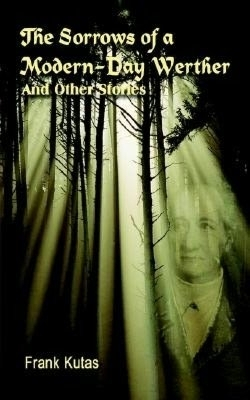The Sorrows of Modern Day Werther and Other Stories
In Frank Kutas’ collection, The Sorrows of a Modern-Day Werther, George and Louise teach one another English and German and fall in love while recounting their war-time experiences. Moving between the essays George writes to practice his English and the conversations the two have as they learn each other’s languages, Kutas explores the sorrows of the modern age.
This collection’s title refers to an exchange between students in a Budapest high school discussing Goethe’s famous novel. One young man talks about how The Sorrows of Young Werther was a disappointment because he cannot imagine a sane man killing himself for a “broad.” George, the protagonist, defends the Goethe piece by saying, “It has one point, which it makes brilliantly: the divine feeling which distinguishes us from lower animals … the love of a woman.” From the start of the book, readers understand that George easily grasps the thin line between “lower animals” and humans, and that he cherishes and values love. This makes even greater sense once it becomes clear that George has witnessed the horrors of war.
The structure of this book ensures that the reader is never bored. Though the dialogue is sometimes stiff and too formal, the stories the two characters share are interesting. Kutas does not shy away from describing the violence of war—including murder and civilian tragedies like rape—and this makes George’s character that much more three-dimensional and sympathetic. Louise’s character is likeable, but it seems strange that she would allow George to kiss her just after their initial encounter. Still, the bonds that these characters form are strong and believable, especially because of the way their experiences during wartime intertwine.
Both Louise and George find themselves connecting and confiding in one another, but they soon realize that they cannot forget or run away from their past responsibilities. Language is everything in this book. The two characters come from different worlds and experiences but are nonetheless able to unite because of their experiences. Difference is overcome through love. However, when the past does seep into the present, the connection the two characters have formed is threatened, making for a suspenseful final section. By the end, the fate of the modern-day, romantic Werther is uncertain, and the reader has to hope that George will have a better end than the protagonist in Goethe’s classic tale.
Reviewed by
Lisa Bower
Disclosure: This article is not an endorsement, but a review. The publisher of this book provided free copies of the book and paid a small fee to have their book reviewed by a professional reviewer. Foreword Reviews and Clarion Reviews make no guarantee that the publisher will receive a positive review. Foreword Magazine, Inc. is disclosing this in accordance with the Federal Trade Commission’s 16 CFR, Part 255.

